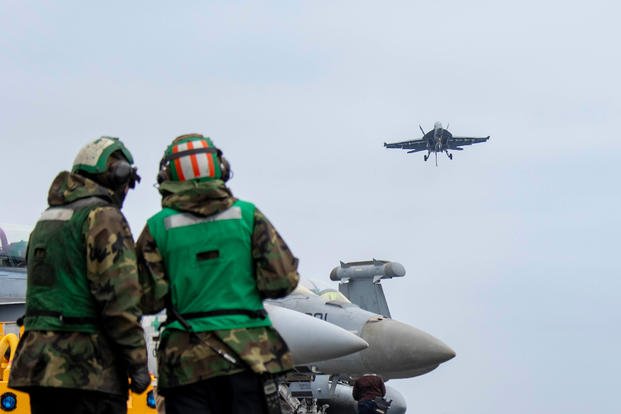An independent panel will study the rates of cancer and deaths from cancer among military fixed-wing pilots and aircrews under a law signed last week by President Donald Trump.
The National Academies of Sciences, Engineering and Medicine will conduct a thorough review on the prevalence of various cancers among personnel who have served on active duty on fighter jets, trainers, surveillance aircraft and other airplanes to determine whether cancer rates are elevated in the aviation community.
A study released by the Department of Defense in 2023 found that, among 900,000 personnel who served on fixed-wing aircraft between 1992 and 2017, aircrews had a 24% higher rate of cancer than their peers in the general population, including an 87% higher rate of melanoma, a 39% higher rate of thyroid cancer, and a 16% higher rate of prostate cancer.
Read Next: Navy Is Retiring the Last of its Storied Cruisers. To Veterans, They Were ‘the Pinnacle of Naval Power’
Following that report, lawmakers said more needed to be done to determine the extent of the association between aviation jobs and cancer.
The Aviation Cancers Examination Study, or ACES, Act was drafted to better understand any connection and to help affected service members get access to proper health care and disability compensation if their illnesses are determined to be service-connected.
Rep. August Pfluger, R-Texas, is an Air Force Reserve colonel who flew on active duty for 20 years. He called the new law “a lifeline” for pilots.
“I introduced this bill in honor of my dear friend and former fighter pilot, [Air Force Col. Andy Shurtleff], who recently lost his life in a second battle he never signed up to fight. We owe it to him, and every service member like him, to properly study the prevalence of military aviation cancer rates,” Pfluger said in a statement Thursday.
“As a former Navy pilot, there are certain risks that we know and accept come with our service, but we know far less about the health risks that are affecting many aviators and aircrews years later,” Sen. Mark Kelly, D-Ariz., said in a statement Thursday. “Veteran aviators and aircrews deserve answers about the correlation between their job and cancer risks so we can reduce those risks for future pilots.”
Battlefield and industrial exposures have long been a concern for military personnel who work around hazardous materials including radiation, chemicals and other toxic substances used in the manufacturing of weapons and systems.
The Air Force is wrapping up an extensive review of the prevalence of certain cancers in personnel assigned to nuclear intercontinental ballistic missile units. To date. those studies have found elevated rates of breast and prostate cancers in that community, but they did not show elevated rates of one particular illness of concern among some members of the community, non-Hodgkin lymphoma.
The Air Force cautioned, however, that the results are not final and based on roughly half the data the service plans to review for the study.
Under the new law, a panel appointed by the National Academies of Sciences, Engineering and Medicine will identify exposures associated with military aviation jobs such as radiation, ultraviolet light, chemicals or other materials.
The group also will examine all existing academic studies on cancer in the aviation community, as well as databases from the Department of Veterans Affairs, the Defense Department, the military services and the National Center for Health Statistics to gain a clearer picture of any relationship between serving on military jets and other fixed-wing platforms and at least 11 types of cancer.
The law specifically directs the organization to examine brain cancer; colon and rectal cancers; kidney cancer; lung cancer; melanoma skin cancer; non-Hodgkin lymphoma; pancreatic cancer; prostate cancer; testicular cancer; thyroid cancer; urinary bladder cancer; and any “other cancers determined appropriate” by the VA and the National Academies.
The law directs the VA to enter into a contract with the National Academies within 30 days.
Related: They Stood Sentry over America’s Nuclear Missile Arsenal. Many Worry It Gave Them Cancer.
Story Continues
Read the full article here

